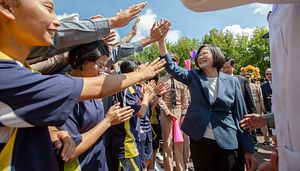Taiwan President Tsai Ing-wen has filed a defamation lawsuit against two professors who have repeatedly questioned, without providing evidence, whether she earned a doctorate degree from the London School of Economics and Political Science (LSE) in 1984.
LSE has provided a copy of Tsai’s dissertation, while Tsai’s lawyers provided other documentation confirming the veracity of her doctoral degree.
Tsai has been dogged by unsubstantiated accusations questioning the legitimacy of her diploma. Much like the birth certificate conspiracy theories that surrounded former U.S. President Barack Obama, these allegations have now gained enough steam to warrant a public response from Tsai.
Last week, Tsai vowed to sue anyone who claimed her academic qualifications were fake, calling the allegations “an example of excessive rumor-mongering” and “an item of fake news.”
Notably, Tsai has filed a civil defamation lawsuit against the two scholars rather than utilizing Taiwan’s Social Order Maintenance Act, which allows criminal prosecution of citizens who spread rumors which can cause harm or public disorder. Legislators within Tsai’s Democratic Progressive Party (DPP) have recently proposed expanding this law to combat foreign influence on Taiwan’s elections.
The lawsuit targets Ho De-fen, professor emeritus at National Taiwan University, and Hwan C. Lin, a professor at University of North Carolina at Charlotte’s Belk College of Business.
Last week, Ho said Tsai had forged her diploma and claimed an independent investigation by Lin proved Tsai never obtained her doctorate from LSE in 1984. Ho and Lin did not reveal the contents of this investigation.
In response, the Presidential Office said it had shown evidence that Tsai completed her doctoral studies and her dissertation, including copies of her dissertation held by National Chengchi University, which employed Tsai after she returned to Taiwan, along with the credentials sent by LSE.
On Thursday, an assistant political science professor at National Taiwan University called on Tsai to publish a copy of her Ph.D. dissertation, according to the Taiwan-based United Daily News, saying the only reasons for Tsai not to do so would be if it was of poor quality or if it revealed that she had failed portions of the tests.
The Presidential Office said on Wednesday that it hoped its move to involve Taiwan’s judiciary would end the “absurd and meaningless questions” surrounding her doctorate.
Tsai finds herself responding to these allegations at a time when she is facing attacks from both the opposition Kuomintang (KMT) and from a contingent of voices formerly allied with the DPP who backed her ex-premier, William Lai, when Lai unsuccessfully challenged Tsai for the DPP’s presidential nomination earlier this year.
Some of these attacks have been sexist in nature. Earlier this year, Koo Kwang-ming, a DPP elder and prominent Lai supporter, said Tsai should step aside for Lai so she could be considered the “mother of the nation.”
DPP elders who had supported Lai formed a new political party, the pro-Taiwanese independence Formosa Alliance, in July. The main voices accusing Tsai of forging her diploma are associated with this party, which grew out of philosophical differences with Tsai and attracts mostly elder DPP members who support independence. Domestically, the Formosa Alliance holds more socially conservative views than the DPP under Tsai, which oversaw the legalization of same-sex marriage earlier this year.
After Tsai won her primary against Lai, the former premier accepted defeat and immediately called for the DPP to unite behind the president. There has been consistent speculation that Tsai could ask Lai to join her ticket as vice president, but Lai has thus far shown no interest in the position.
The upcoming legal case may test how far those who had supported Lai will go in opposing Tsai, rather than following the lead of Lai himself and calling for party unity to defeat Kaohsiung mayor Han Kuo-yu, the KMT presidential candidate, or a potential bid by Foxconn founder Terry Gou.
Tsai’s decision to sue the scholars surprised some, as it ensured the saga of her diploma would continue to carve out space in Taiwan’s news cycle. But perhaps she, like Obama and other politicians hounded by unfounded theories, decided this story was not going to go away unless she took firm action.

































